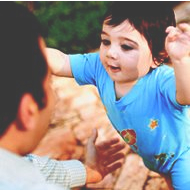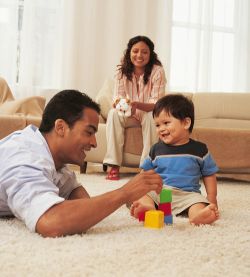December 2007 - Social-Emotional Skills
Main Content
Family Resources: December 2007
One of the of the aims of the TRIS project is to raise awareness of rare trisomy conditions and the variety of situations and concerns families encounter. This page is intended to share resources that families can use in their daily lives.
We are archiving previous months' Family Resources pages.
Social-Emotional Skills
 A child’s social-emotional skills assist her to communicate, connect with the world around her and resolve conflicts with others. As with other skills such as communication, cognitive, and physical development, a child needs practice to develop social-emotional skills. Social-emotional skills are not as easily seen as some of the other skills children learn such as rolling, reaching and vocalizing. Learning to identify our children’s cues and needs will help parents to promote their child’s social-emotional development.
A child’s social-emotional skills assist her to communicate, connect with the world around her and resolve conflicts with others. As with other skills such as communication, cognitive, and physical development, a child needs practice to develop social-emotional skills. Social-emotional skills are not as easily seen as some of the other skills children learn such as rolling, reaching and vocalizing. Learning to identify our children’s cues and needs will help parents to promote their child’s social-emotional development.
Below are some ideas for promoting social-emotional development in children:
- All children need to be comforted when they are upset. Hold your child. Speak soothingly and calmly. She will let you know when she is feeling okay again.
- Spend time with your child and help her explore her world and get to know the people in it.
- Young children need consistent routines. Have a few routines
and stick to them. - Let your child see your emotions. Point out when you are happy, sad or silly.
Social-emotional development follows certain stages. Here are some key milestones:
- Develop a sense of self and of belonging to a family.
- Develop a language-based communication system with parents and caregivers.
- Learn to separate from their parents.
- Learn words to label their emotions.
- Engage in pretend (make-believe) play.
- Play near other children but not with them — often imitating the actions of others.
- Play with other children.
- State their desires and wants.
- Share and take turns.
- Use words to solve conflicts and develop control of their emotions.
- Learn that it is okay to make a mistake.
- Develop self-confidence and self-respect.
- Develop respect for others and feelings of empathy.
 Both of the above lists can be accessed at the following websites.
Both of the above lists can be accessed at the following websites.
Ideas for Social-Emotional development and Social-Emotional Stages
For additional stages of social-emotional development please visit the following link.Social-Emotional Stages
For additional activities and ideas to promote your child’s social-emotional development, please try the this link. Social-Emotional Activities
Beyond Play offers many toys and games to help aid in your child’s social-emotional development. Follow the link to locate their website for additional ideas.



